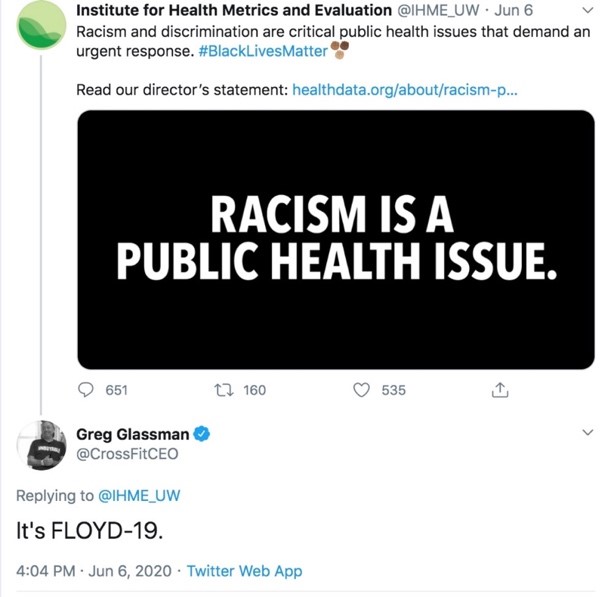PR | 23rd of July, 2020
Let Hyper-localisation do the heavy lifting
The impact of Covid-19 continues to be felt across the sporting spectrum, not least amid the ongoing fall-out from the cancellation of the Scottish Premiership season.
One crisis is more than enough for most organisations to contend with but two concurrent crises on your doorstep has created a perfect public relations storm.
CrossFit is the global; fitness phenomenon which has had to contend not merely with the financial impact of a global pandemic but the enforced resignation of its owner and creator, Greg Glassman, after this cloth-eared and colour-blind response to a post from the Institute of Health Metrics and Evaluation:

Cue the immediate severing of ties from long-standing sponsor Reebok, its most successful athletes disassociating themselves from Glassman, and more than 15,000 affiliate gyms across the globe reconsidering their $3000-per-year annual affiliation fee.
A reputational, racism-related crisis for a $4bn industry is bad enough without it occurring in the midst of worldwide lockdown, with gyms rating highly on the risk register of industrial-sized infection spreaders.
Localisation - the reappraisal and rekindling of relationships with nearby amenities during COVID times - has been one of the precious few upsides of a worldwide infectious disease.
“The Global Pandemic Could Transform Humanitarianism Forever” claimed a recent report in The New Humanitarian, on the subject of how the pandemic will change the face of crisis aid: pointing to key factors such as the threat to big institutions, the benefit of localisation, revival of solidarity and the breaking of the traditional business model.
But what does this have to do with a sport oft derided by critics for a cultish persona and now mired in self-doubt among its disciples since its leader’s inglorious demise?
In the search for COVID comms best practice, the organisation with the biggest macro-level reputational issues has, at its local affiliate root, executed an unwitting communications masterclass.
In this new age of Zoom cocktail parties and Amazon Anonymous-level online shopping, the pursuit of health and wellbeing has been a daily challenge. Not all of us wear capes like Captain Sir Tom Moore but as we look closer to home, the local gym’s relocation to your living room has been a best-in-class example of prized pivoting and community-focused comms.
Since closing its doors in the days prior to lockdown, CrossFit Glasgow, an affiliate gym in Glasgow’s Commerce Street, has been a model of consistency throughout the cumulative crises enveloping it.
Consciously or otherwise, the emotional video acknowledging the enforced closure by its co-founders, Iain Barbour and Gavin Heselton, addressed the three fundamentals for crisis communications: Regret, Reason, Remedy.
The regret at closing was heartfelt, not least since the decision was taken in the interests of member safety but at great potential risk to the business and life’s work. The rationale was prophetic: days later Boris Johnson and Nicola Sturgeon announced lockdown measures that, for gyms, remain in place 13 weeks later.
The remedy is what sets its strategy apart. The foresight in closing before lockdown enabled the team to disinfect and distribute the equipment – all the equipment – to help members stay one step ahead of the clamour for home equipment by loaning bars, kettlebells, wallballs and speed ropes by way of a ballot.
Cash flow has been the enemy of all businesses during lockdown so the challenge in retaining memberships (which comes at a premium compared to the PureGym low cost, low maintenance model) required a swift but methodical move to online WODs - or workout of the day – and the need to provide even greater value for money than the traditional class structure.
The awkward conversation took place early: not everyone can retain a gym membership when a) the gym is closed and b) members’ personal circumstances may have been impacted by COVID. To that end, those who wished to freeze or cancel were free to do so, those who wished to move to a 50% membership could do so and those who were willing and able to maintain their full membership for the amended service could also do so. No questions asked, no guilt trip, no judgment.
The clear, consistent and empathetic messages have not only helped retain memberships but arguably done more to reinforce the sense of community by being more than just a CrossFit gym online. How much more? The current diary of events includes:
- Daily programmed WODs overseen by instructors with a YouTube video briefing
- Additional gymnastic, nutrition, weightlifting, mobility and flexibility classes throughout the week as ‘added value’ services within the membership
- Coffee mornings to keep the conversation going
- Friday night Zoom quiz
- Bake-off (for those burned calories have to be replenished, eh?)
- End of week video message to update on implications of any government briefing on the gym and the path to reopening.
- Personalised chat conversations between members and instructors to stay motivated and stay in touch.
While other industries and sports, at a local and national level, have wrestled and sometimes faltered in balancing business reality with customer service, CFG has succeeded where even its overarching body, CrossFit Inc, has failed.
It has done so by being authentic and innovative in the transition.
Yet just as the country prepares for entering Phase 2, with the light at the end of the CFG tunnel visible, Glassman struck. The David Koresh of CrossFit not only damaged his own reputation and legacy irreparably, but threatened the stability of the entire affiliate structure in 14 Twitter characters.
Faced with members wishing CFG to disaffiliate immediately from the Glassman mothership, and others considering alternative gyms in the event they didn’t, the COVID pandemic was compounded by another crisis not of their doing.
Again the response was clear, considered and appropriate. The most resonant section of the extensive member statement – issued amid the stampede from businesses to observe #BlackoutTuesday irrespective of their organisation’s diversity credentials - stated simply:

The Cuban philosopher and poet Jose Marti deigned that in a time of crisis “the peoples of the world must rush to get to know each other”.
On a local level, the proactive communications of one affiliate gym to a beleaguered brand has enabled people get to know each other a little better.
Darryl Broadfoot
Head of sport PR
